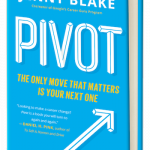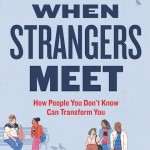Jennifer Gilbert has the kind of life for which the phrase “having it all” seemingly was invented. Named an “Entrepreneur of the Year” by Ernst & Young, she’s the founder and chief visionary officer of Save the Date, a New York–based special events company, which, with a client list ranging from Oprah Winfrey to the Bill Gates Foundation, successfully combines high gloss and substance.
A polished blonde, Gilbert divides her time between Manhattan, where she both works and lives with her husband and three children, and the Hamptons. She is glamorous enough to have been added to the cast of the third season of “The Real Housewives of New York City” reality show, and likable enough to have been dropped from the show for—critics speculated– being too nice.
Behind her perfect exterior, however, Gilbert for many years hid what she calls her “scary, bad, ugly”: As a young woman just starting out in New York, she was followed from the subway and into an apartment building by a man who stabbed her 37 times with a screwdriver. Kicking, screaming, and clawing, Gilbert fought off her attacker, and was certain that she was dying.
The experience left her scarred and feeling damaged, isolated, and joyless—like “a heart beating without a soul,” she writes in her recent memoir, I Never Promised You a Goodie Bag: A Memoir of a Life Through Events—the Ones You Plan and the Ones You Don’t. She told no one about her attack and went on to become an event planner, because she was good at it and because it gave her a way to surround herself with other people’s joy. She writes: “It was the only way I could feel happiness myself.”
In her book, Gilbert tells how she built and then trans- formed her business and her life, one step at a time. She would have never told the story, she says, if one of her twin sons hadn’t developed alopecia, an immune disorder that causes baldness, as a toddler. When her son was diagnosed, Gilbert found herself slipping back into her old habits of shame and denial. She had learned how to let things go to help her clients survive a crisis, “but when it came to my own son, all I could do was cry,” she said in a recent interview. “I needed to let it go. I needed to get over it for him.”
Gilbert writes: “Once you stop fighting yourself and the things you can’t control, and surrender—just let go—then you find your power and energy to move forward. …We can all have a do-over, if we just let ourselves.”
When I spoke to Gilbert about her book by phone—she was in the Hamptons—her responses struck me as unrehearsed and utterly genuine. In fact, she seemed to be a little amazed that the story she had buried for so many years—and considered, she said, to be “so yuck”—was out in the world, and resonating deeply with readers.
Gilbert has been asked to speak about her memoir to groups, and when she does, “I am so not used to talking about [the attack], I never know what I am going to say,” she said. “I do not know the answers to a lot of the questions.” She added: “You deal as well as you can, and there are things that will shape you forever. But I can share the experience that not knowing is okay. Sometimes you do not know what you want until you know what you do not want. But no motion is just stuck.”
One of the things that is powerful about your book is that you do not minimize your struggles.
Everybody has got their story. Everybody has got their “something.” Mine just happened to have been this. I was really good at putting the mask on. I was not so good at taking the mask off. And I felt … I felt terrible. And I went through really, really hard times. I felt the only way to be really true is to talk about the really “bad ugly,” and how it felt to be lost and scared and alone and trapped.
Your book is a business book as well as a personal memoir about transcending trauma. Can you talk about your decision to combine the two?
I do not know if I could separate myself from one part or the other, because I am all of it. There was always this shiny, fabulous outside person who went to all the clubs, and who looked pretty and knew everybody and did the whole thing.
And I feel like if you did not understand that my business was just as important to me as somebody having a child at that age, you have missed who I was and how I think about things—how I was not afraid to go for what I wanted. What was there to fear in life, once somebody tries to kill you? Your feeling of fear is not the same as most people. Fear of failure? So what? I will pack up and do something else. It never occurred to me to be afraid that it would not work out.
Were you fearless before the attack?
I think that I was resilient before the attack. I think that it is something that people are, A) a little bit born with, and B) [it was a result of] growing up in my family. I had to take care of myself. I always knew I was going to have to figure “it” out, whatever it was. There is some sort of part of me that does not break down when things go wrong. I think very clearly and I try to figure out what to do.
One of the satisfying parts of the book for people associated with the meetings and events industry are the stories of how you’ve found creative solutions during moments of crisis at events. Do you consider that ability to be an inherent trait, or do you think the fact that you survived and transcended your attack had something to do with that?
I thought that I was really good at my job because of my attack, because I was able to think on my feet. I felt really calm in a storm because the worst thing had happened to me. And I think there is something about going through trauma and pain that results in really understanding how to be helpful to others. When people are going through something [upsetting], most people want to say, “At least it’s not worse.” If an invitation came the wrong color or the cake never showed up, I wouldn’t say, “Well, at least it is not raining out.” Yes, it is not raining out, but that does not help the fact that the cake did not show up.
When you are in the middle of something, you do not want to hear that it could be worse. You just want people to be there for you and do something that honestly makes you feel better.
Isn’t it asking too much of people, when they are going through pain, to ask them to isolate the one thing that could be worse to make them feel better about what is actually happening? It’s very self-serving. People do not understand that. They think they are helping, but actually, they are not.
You were not a control freak before the attack, correct?
Oh, no. I was not.
You were kind of a slob.
Yes, absolutely.
Do you feel like becoming a control freak was a direct result of the attack?
Yes. I knew ultimately, I have no control of my life, not really. I think the way that I gained control was through the things around me … physical things, tidying things up. That makes me feel like I can breathe. Because when things are chaotic in my house and my life, it just adds more chaos, and it does not calm me down emotionally. I went through many issues in my life, and it was all about control. If you cannot control anything externally, you try and control the things that you can.
If event planning is a mix of control and flexibility, how do you find the balance?
I think that at the end of the day, you have to let go emotionally. Because it just is not going to help anybody if you start to get hysterical. While I am in the moment, while it is really emotional, I think: “Okay, I have to separate myself out, figure out what I can do and what I can’t do.” And make whatever I can work, because it is way more about how you present it. I tell my office staff: You can get anything you want in life, it is all in the way that you ask. If you go at somebody in a certain way, you are going to get a certain type of reaction. So you have to learn when to be more flexible, and ask yourself, what is the best thing that we can do to make it better now?
An event is a living, breathing thing. You can do your timelines up and down through next week to the second, but if a truck breaks down and your rentals do not show up, guess where the timeline goes? At the end of the day, things happen that are beyond your control.
Do you think that this resilience enabled you to stay on your feet during the rollercoaster economy of the last few years?
There are a lot of people who have had to close their doors because they could just not ride it out, because the economy has been horrible and because they were stuck in what their niche was and who their clients were. And I understand that, because we had problems.
The first thing that I had to do was to talk to everybody and cut salaries. And we rented out part of our office. My staff had to know that I would do anything possible to save the business, and if they were not going to be part of that, then this was not the right company for them. If I had been emotional and just sat and cried every day, my business would have been gone.
So, the first thing I had to do was cut the losses. Then I had to go to the clients that I had and see if there was anything we could do. And if there wasn’t, I had to come up with new clients or new business, which is what we did.
There are a lot of layers in your book—it is a memoir, a business book, and it could serve as a primer for how to talk to a friend who has gone through a tragedy.
It was very, very edited, because each of these layers had its own book in it, but it all had to tie together. People say to me they could not put it down, that it just flows. The reason why I think it worked and why people are responding this way is because I am an event planner. An event has timing and a tempo and an energy to it. You have to know how to pace it. And my book, I treated it like an event. Just when you felt like you were satiated with something, I went in a completely different direction.
Have there been any changes in your relationships with clients as a result of your book?
I do not know how many of my clients have read the book. Maybe you put it out there, but you can’t send it to four thousand people. A lot of them have [read it]. A lot of them loved it. A lot of them, they loved me before, but now they kind of get it. I think it makes people feel better about working with our company, to know that …it really started about celebrating.
One of [my clients] said to me, “Now I understand the reason why you fight so hard for me.” Because I get what fighting is, and I do not understand the word no. And I just want the best for my clients. And so I go into every situation with, “Yes I can.”
What about the goodie bag in the title?
It is a universal truth that people love a goodie bag. But to me it always seems sort of sad. You are waiting for what you are going to get on your way out. Instead of just being in the moment and enjoying the party that someone has spent so much time putting together, people are reduced to worrying about goodie bags and fighting over who is getting the better one.
Just be here now. Be in this moment, inside the event, and appreciate and enjoy what has been an army of people’s work, for how-many months. [A goodie bag] is something you may or may not like, as you are leaving. How sad is that? It is always looking to the next thing, instead of just being in it. Like I said in the book, it is not about the presents, it is about your presence.
If someone had told me my life would have worked out that way, …what do you really know at the end? The end is that you just have this day, and that is all you know. So, make it count. You have one life. Make every day count, and stop waiting for your gift to happen some other time.
Sidebar: Book Excerpt
Book Excerpt From I Never Promised You a Goodie Bag: A Memoir of a Life Through Events — the Ones You Plan and the Ones You Don’t
I had heard about a course at MIT called “Birthing of Giants.” A master’s program for entrepreneurs, it was an intensive series of classes in all the high-level stuff that I’d never thought about in a concrete way — vision statements, corporate culture, best practices. … I worked in a female-dominated industry, my employees were women, and I’ve always thrived on my relationships with women. Not only was this totally male-dominated environment alien to me, but I felt deeply intimidated by the other students’ knowledge. Most were MBAs with all kinds of business expertise that I’d learned by my wits — not in graduate school. I felt like such a fraud. Here I was, just having won [the Ernst & Young Entrepreneur of the Year award that] most of them had applied for and lost, and I had already forgotten about that accomplishment. So I put on my tough exterior armor and sat at the front of the class, absorbing the coursework like a sponge but speaking to no one — at least initially. When the others were getting together for drinks in the evening, I was back in my dorm room, poring over what I’d learned during the day. I’m sure I was known as “that bitch from New York.”
Over time though, I started to warm up, and I was deeply affected by the passion of my fellow students. There was always an incredible array of speakers, and each of the business owners who attended was invited to tell the story of his or her business at some point during the course. I listened while these strangers spilled their hearts about what their businesses meant to them, and how they had poured so much meaning into their work. For the first time, I felt surrounded by kindred spirits. I realized a truth that has stuck with me ever since: Everyone’s got their something. Everyone in that room had a story — whether it was sickness, poverty, divorce, or some other adversity — and they had all channeled their personal challenges into something beautiful. Their stories might be different from mine, but we all had one.
Finally on the last day of the course, I was the only person who hadn’t spoken. This was at a time when the people who knew what had happened to me were a very select few, and certainly no one in my office knew. I’d never sat down and told a bunch of girlfriends what had happened, much less 64 strangers whom I’d been so intimidated by just a short time before. In telling me their stories, these strangers had shown me the respect of treating me as their equal, as if I was as worthy as they were to sit in that room.
I got up in front of them, and for the first time in my life I told a large group of people about my personal tragedy, and how my company had been born of my commitment to spend the rest of my life helping people celebrate. I said that I got up every day and helped people to laugh and express themselves, and I loved what I did. Their response was staggering to me — a standing ovation followed by dozens of emails telling me how much my story had meant to them.
It was a life-changing experience for me to reveal myself that way among peers, and to feel nothing but respect, acceptance, and gratitude in response. It taught me that at least some of the time I could fully be myself — all the sides of me present and visible for the world to see.
I took everything I learned at MIT and I brought it back to my company. The first thing I did was change my title to chief visionary officer: aren’t events, and business, and life, all about vision? Inspired by my experience of telling my story, I decided that it was time to come clean with my people about who I was and why I believed so strongly in the work that we did. I gathered all my employees together for an off-site retreat, and we talked about our mission statement as a company and why they thought our work was important. And then I told them my story, every bit of it, and then said, “I’m sorry for not expressing my gratitude for all those years.” I broke down and cried right there in front of them, looked around into caring, tearing eyes. … I realized it was no longer enough just to work hard and expect everyone around me to do the same. We all needed to know why we were there, and why our work mattered. Of course, I also hoped that they might gain some understanding of — and maybe a little forgiveness for — the scary mask I’d worn for so long.
More Resources
Learn more about Jennifer Gilbert at savethedate.com. Watch a trailer for I Never Promised You a Goodie Bag.



